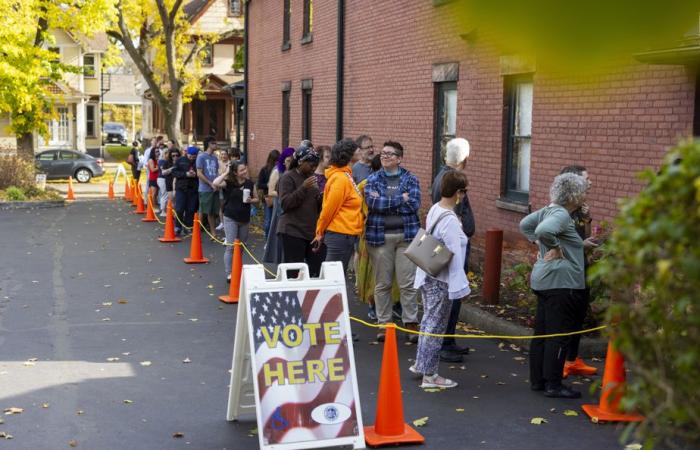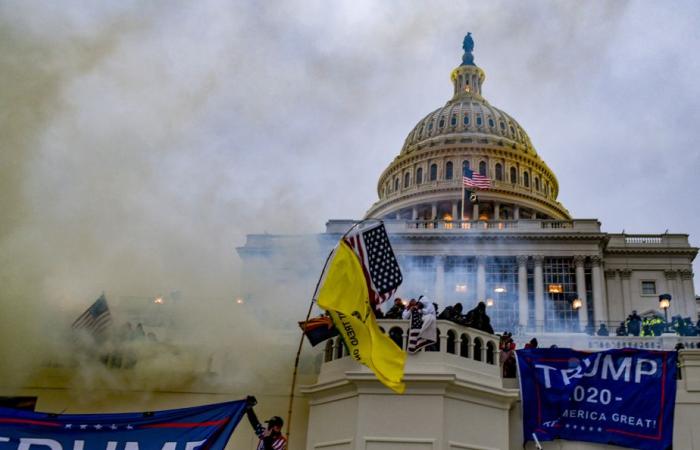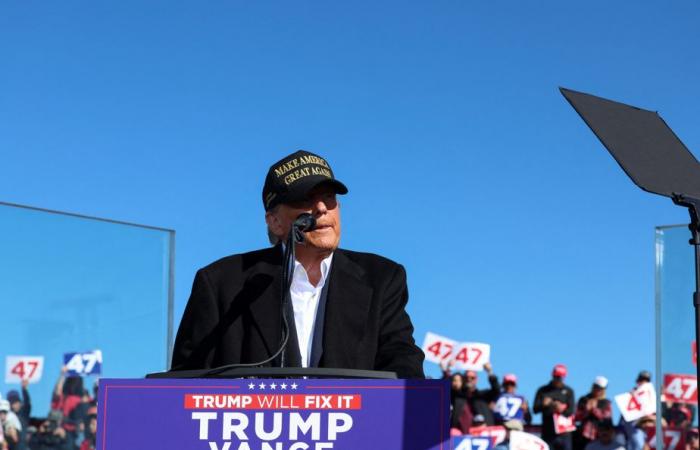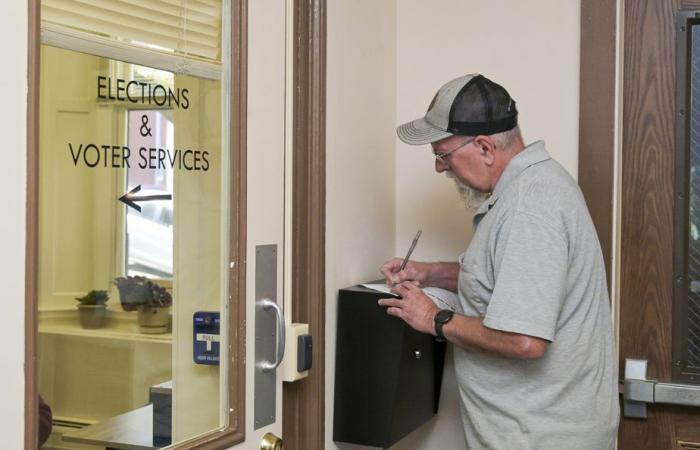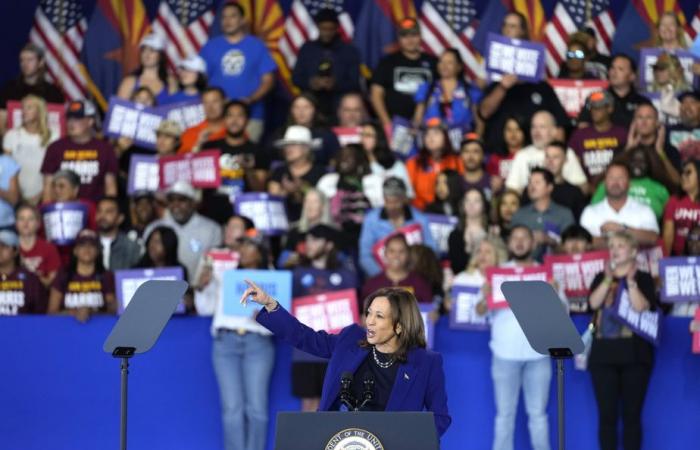Nearly half of American voters doubt the proper functioning of American democracy, with 45% of them believing that their political system does not represent ordinary citizens well. This is what a survey reveals New York Times-Siena College.
Published at 0:00
Nick Corasaniti, Ruth Igielnik et Camille Baker
The New York Times
Three-quarters of American voters believe that democracy is under threat, although their perception of what endangers it varies widely depending on their political leaning.
A majority of voters believe the country is rife with corruption, with 62% believing the government works primarily in its own interests and those of elites, rather than in the public interest.
Frustrations and loss of confidence
The erosion of trust in the nearly 250-year-old U.S. government follows four years of unprecedented challenges: a violent riot aimed at overturning the 2020 presidential election, the criminal conviction of former President Donald Trump and his insistence that the electoral process is rigged.
PHOTO KENNY HOLSTON, ARCHIVES THE NEW YORK TIMES
Supporters of former President Donald Trump storming the Capitol in Washington during the certification of the results of the 2020 presidential election, January 6, 2021
Faced with soaring inflation, culture wars that divide American society, and geopolitical crises, voters are expressing exasperation with politics and a government that they say has failed to serve them, including understood to satisfy their most basic needs.
“I have to go to a food bank, even though my husband and I earn a decent salary. We can’t make ends meet with three kids,” said Tyra Jackson-Taylor, 51, a social worker from Norfolk, Virginia. “It’s a lot, I have to work and he works overtime, just to try to make ends meet. »
These frustrations have led 58% of voters to think that the country’s financial and political systems need to be fundamentally changed, or even completely redesigned.
Despite everything, voters reaffirmed their confidence in the electoral process. Nearly 80% of voters – including a majority of Republicans, Democrats and independents – believe the results of the 2024 presidential election will be reliable. This confidence represents an improvement from two years ago, when about 70% of voters said they had confidence in the results of the midterm elections.
Whose fault is it?
Americans view mainstream media and social media as particularly bad for democracy, although Republicans are more likely than Democrats to blame news organizations. But political polarization also affects Americans’ perceptions of who is to blame.
Republicans view Vice President Kamala Harris, President Joe Biden and Democrats in general as harming democracy. They also cite mail-in voting, electronic voting machines, immigration and even the Justice Department.
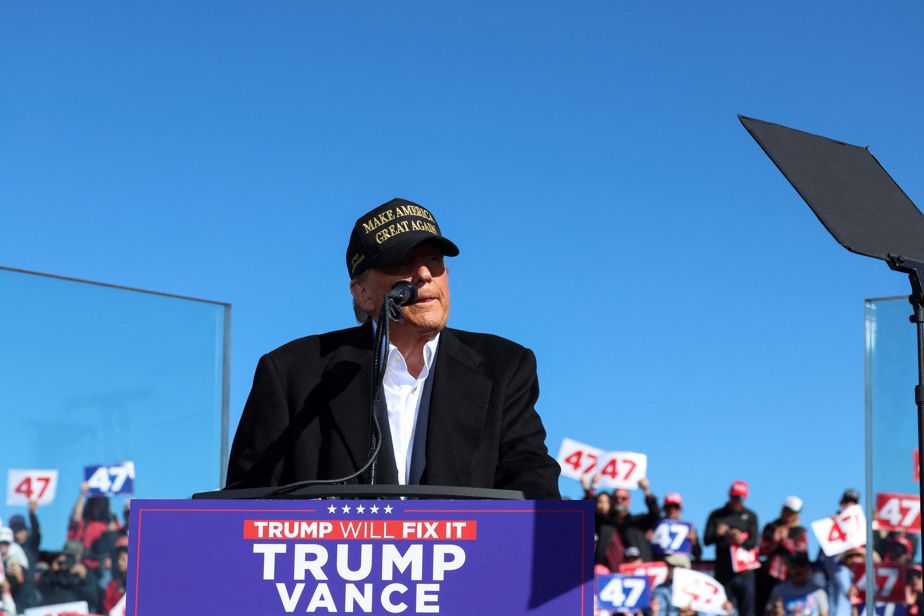
PHOTO BRENDAN MCDERMID, REUTERS
Republican candidate Donald Trump at a rally in Albuquerque, New Mexico on Thursday
For their part, Democrats see a central threat to democracy: Donald Trump.
“He’s a dictator incarnate,” said Jeffrey Braman, 51, a military veteran from Lansing, Michigan. He expressed concern that “more than 70 million Americans believe in him,” referring to the number of votes Mr. Trump received in 2020. “More than 70 million. This means they want a king. Someone who will dictate their behavior to them. »
However, few voters say concerns about democracy are at the heart of their vote. Only 7% of voters agree that democracy was the most important issue regarding the presidential election.
However, voters, and not just Democrats, also expressed discomfort with the autocratic tendencies of political leaders. Only 21% of likely voters agree that a president should be able to override the law to do what he believes is best, rather than staying within existing rules and laws. Two years ago, 30% of voters agreed with the concept of a president acting outside the law.
A new attempt at electoral fraud?
Voters are very concerned about how Mr. Trump will handle the election results if he loses. Six in ten voters are not convinced he will accept the results. And nearly half of voters – including 12% of Republicans – fear that he and his allies will try to overturn the election through illegal means.
“Trump is so radical,” said Katherine Muth, 74, of Elk County, Pennsylvania.
Most voters, all political persuasions combined, are convinced that Mme Harris will accept the results of the election, and few fear she will try to overturn them if she loses.
Some speeches resonate, others do not
While voters are widely worried about another attempt at electoral fraud by Mr Trump, they also appear to have been influenced by his repeated lies about fraud in the US elections.
Although fraud is extremely rare and the Republican nominee has often made unsubstantiated claims, there are more voters concerned about people voting illegally than about eligible voters being prevented from voting. This is a turnaround from two years ago, when slightly more voters were concerned about voter suppression than fraud.

PHOTO HEATHER AINSWORTH, ARCHIVES THE NEW YORK TIMES
Floyd McIlwain fills out an absentee ballot for the 2024 general election at Bradford County Election Services in Towanda, Pennsylvania, on October 22.
The poll also shows that voters don’t necessarily believe some of Donald Trump’s most provocative statements. Asked about his recent threats to use the National Guard to deal with Americans he called “enemies within,” just under half of voters – including a quarter of Republicans – said they had taken the comments from the Republican candidate seriously.
Mr. Trump’s allies often insist that voters should not take the former president literally when he makes these types of statements; the results suggest voters got the message.
Voters, however, believe some of Mr. Trump’s most coherent campaign speeches. Three-quarters of voters said they took seriously that the Republican would deport millions of immigrants living in the United States without legal status, and nearly 60% said they took seriously that the former president would support on the Justice Department to prosecute his political opponents.
A polarized nation
The language of Donald Trump, who describes some of his compatriots as “enemies from within”, found little resonance with his electoral base. Only 11% of her supporters called the voters who chose Kamala Harris enemies. Instead, the vast majority said they were simply fellow Americans with whom they disagreed.
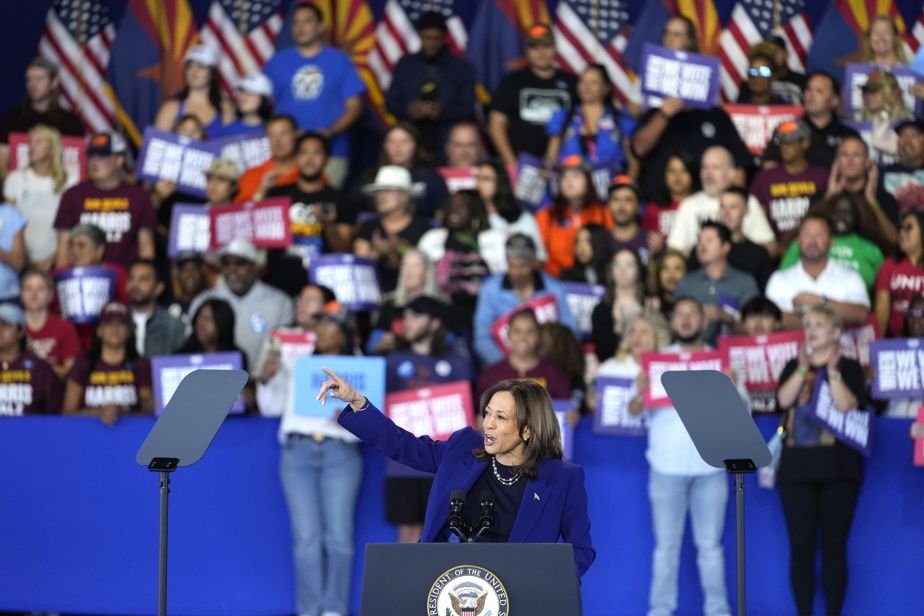
PHOTO MATT YORK, ASSOCIATED PRESS
Democratic candidate Kamala Harris at a rally in Phoenix, Arizona on Thursday
In fact, supporters of Mme Harris are slightly more likely to describe voters who prefer Mr. Trump as the enemy; 16% of them said so.
Yet nearly 60% of voters say the Republican candidate has worsened partisan divisions in the country; 37% say the same thing about the Democratic candidate.
A hard core – about a third of voters – believes the country’s problems are so serious that it is on the verge of failure. A majority of Republicans – and 16% of Democrats – have a fatalistic attitude about the nation’s future.
“The Washington elite controls everything, and the will of the people has been ignored,” said Randal Parr, 72, a retired farmer in Lebanon, Indiana. “And it’s not just Democrats or Republicans, but the Washington elite. »
About the poll: It was conducted from October 20 to 23, among 2,516 voters called across the United States.
This text was first published in the New York Times.
Read the article on the website New York Times (in English; subscription required)

